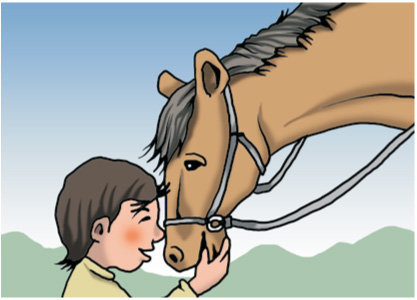The horse boy
The horse boy
Posted August. 03, 2022 07:38,
Updated August. 03, 2022 07:38

A boy ran towards where the neighbor’s horses were assembled. He laid beside the horses and giggled. It was a dangerous moment as the boy might be trodden by the hoofs of the horses. However, the horses did not budge at all. In fact, a particularly wild mare, the leader of the five horses, lowered her head and gently licked the boy. It was a sign of voluntary submission.
It was an astonishing episode, given that the boy was unable to understand what others meant to say and was not potty-trained even by the age of six. He yelled in protest all the time—the boy was autistic. Yet the horses gave in to him. Can the horse better understand the boy than the boy’s own parents? The parents sought advice from an autistic zoology professor. “Animals think in image; I think with imagery, and so do many autistic people. Animals are visual thinkers,” the professor said. “That is why many autistic people better bond with animals.” It was not only the horses that drew forth the response from the boy. The child seemed to be at ease when he was with nomadic Shermans who were from Botswana. The parents, so desperate to even catch at a straw, decided to go to Mongolia, the home of horses. They bought plane tickets with all the money they got and raised travel expenses from signing a contract for a book of their journey. As absurd as it may be to anchor their hopes in horses and Shermans, the parents were determined to follow the advice from the zoology professor who said, “The worst thing you can do is do nothing.”
Then something amazing happened. On their way back from the meeting with the Sherman from the reindeer tribe across mountains on the back of the horse, the boy started to go to stool by himself. He responded to the questions thrown at him and no longer exploded in anger. It was just as the Sherman predicted. British author Rupert Issacson wrote a nonfiction entitled ‘The Horse Boy’ about how his son’s autism gradually improved. The world we live in is not hesitant to consume other people’s pain and suffering, as long as that pain is not one’s own; however, the desperate struggle and devoted love of the parents of an autistic child refuse to be consumed. While reading the book, readers get to reflect on their ignorance to other people’s pain, unless such things become one’s own business.






